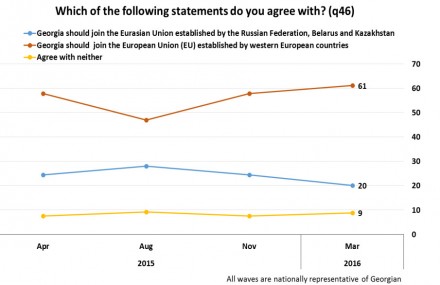
TBILISI, DFWatch–The proportion of Georgians who think their country should join the Russian-led Eurasian Union has fallen by about ten percent since August, 2015.
20 percent of Georgians now agree that they should join the Eurasian Union, according to a new opinion poll published Monday by the National Democratic Institute (NDI).
According to poll, 61 percent supports Georgia joining the European Union. Last year, respondents were asked separately whether they would like Georgia to join the Eurasian Union and the EU; less than 50 percent said they would. This year, NDI asked respondents to choose one or the other. Nine percent said they wouldn’t like Georgia to join any of these unions, nine percent said they didn’t know and one percent didn’t answer.
In a separate question in the new survey, people were asked if they approved or disapproved of the Georgian government’s stated goal of joining the EU; 77 percent approved, while 14 percent disapproved.
84 percent of the people questioned said they support the introduction of visa-free travel to Schengen countries. Eight percent said they do not support this, while seven percent answered that they don’t know.
47 percent believe that Russia is the greatest threat to Georgia. Eight percent think the terror group ISIS is the greatest threat to Georgia; seven percent believe it is United States, five percent Turkey and two percent said NATO is the greatest threat. 27 percent said they don’t know which country or organization would be threat to Georgia.
68 percent approve the Georgian government’s stated goal of joining NATO, 19 percent disapprove, and the rest do not know.
To the question ‘in your opinion, should Georgia’s foreign policy be…’, 14 percent say pro-western, 52 percent say pro-western, however good relations have to be maintained with Russia, 16 percent say relations should be pro-Russian, but maintain good relations with EU and NATO, 5 percent say only pro-Russian, 12 percent do not know or didn’t answer.
The survey was conducted in February and March, 2016 and 3,900 people were questioned. The margin of error is +/- 1.6 percent.

